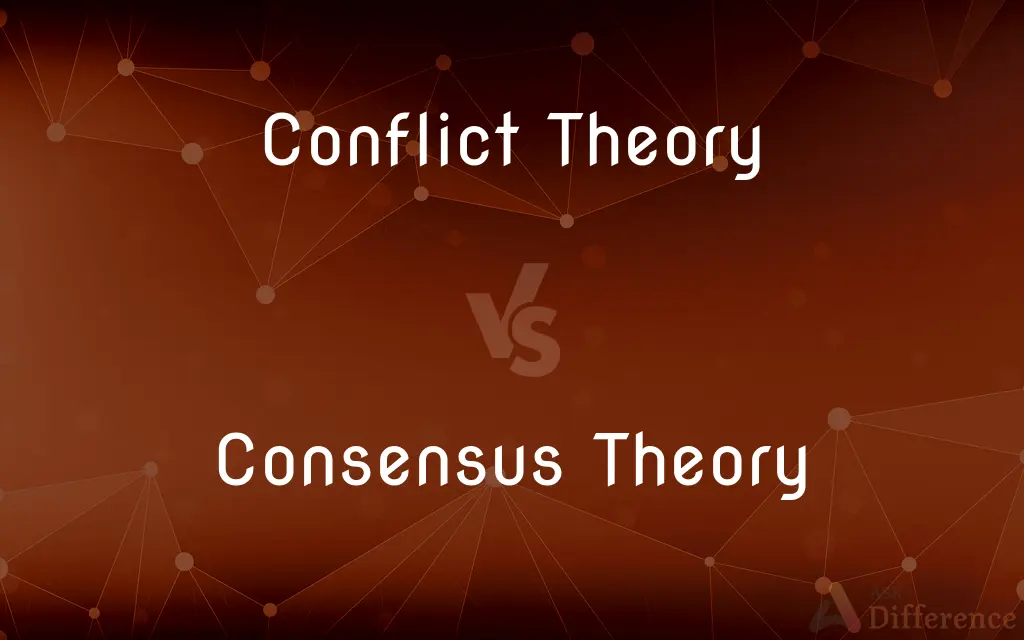Conflict Theory vs. Consensus Theory — What's the Difference?
By Fiza Rafique & Urooj Arif — Published on March 3, 2024
Conflict Theory focuses on societal changes driven by tension and power struggles, while Consensus Theory sees social order as based on shared norms and values.

Difference Between Conflict Theory and Consensus Theory
Table of Contents
ADVERTISEMENT
Key Differences
Conflict Theory posits that society is characterized by perpetual conflict due to competition over limited resources. It argues that social order is maintained through power and coercion, highlighting the role of domination and economic disparity in shaping societal structures.
Consensus Theory, on the other hand, suggests that social order is achieved through the general agreement of shared norms and values. It emphasizes cooperation, integration, and stability, arguing that societal consensus on moral and ethical standards is key to maintaining social harmony.
While Conflict Theory is often associated with a more critical approach to understanding social dynamics, focusing on inequality and the ways in which certain groups maintain dominance, Consensus Theory adopts a more positive view, emphasizing the role of institutions in promoting cohesion and agreement among society's members.
In terms of methodology, Conflict Theory draws heavily on the works of Karl Marx and tends to focus on macro-level analysis of society, examining the overarching structures that perpetuate inequality. Consensus Theory, influenced by Emile Durkheim, often employs a functionalist perspective, looking at how different parts of society contribute to its overall functioning and stability.
Despite their differences, both theories offer valuable insights into the mechanisms of social order and change. They each provide a lens through which to examine the complex interplay between individual actions and societal structures, albeit from opposite perspectives.
ADVERTISEMENT
Comparison Chart
Focus
Power struggles and inequality
Shared norms and values
Key Proponents
Karl Marx, Max Weber
Emile Durkheim, Talcott Parsons
View on Society
Society is in a state of perpetual conflict
Society is based on a consensus of its members
Approach
Critical, highlighting dominance and disparity
Positive, emphasizing cooperation and stability
Methodology
Macro-level analysis of societal structures
Focus on societal functions and integration
Compare with Definitions
Conflict Theory
Emphasizes social inequality and power differentials.
Conflict Theory explores how wealth disparity affects societal relations.
Consensus Theory
Emphasizes the role of institutions in maintaining social order.
According to Consensus Theory, education instills shared norms.
Conflict Theory
Examines the dominance of particular groups over others.
It scrutinizes how certain social groups maintain power over others.
Consensus Theory
Believes in cooperation and integration for societal stability.
It suggests that a collective agreement on laws benefits society.
Conflict Theory
Focuses on the role of coercion and conflict in social order.
According to Conflict Theory, laws often serve the interests of the powerful.
Consensus Theory
Focuses on social functions and contributions of various parts.
Consensus Theory examines how different sectors contribute to social order.
Conflict Theory
Sees societal change as the outcome of power struggles.
Social movements are viewed as catalysts for change in Conflict Theory.
Consensus Theory
Views society as based on a general consensus.
Consensus Theory posits that shared values create social harmony.
Conflict Theory
Highlights economic exploitation and class conflict.
Conflict Theory analyzes how labor exploitation leads to class struggles.
Consensus Theory
Sees societal consensus as key to reducing conflict.
It argues that consensus on moral values decreases societal disputes.
Common Curiosities
What is the main difference between Conflict Theory and Consensus Theory?
Conflict Theory focuses on power struggles and inequality, while Consensus Theory emphasizes shared norms and values for social order.
What does Consensus Theory focus on?
It focuses on the importance of shared norms, values, and institutions in maintaining social order and stability.
Can these theories be applied in understanding modern societies?
Yes, both theories offer valuable perspectives for analyzing the complexities of modern societies.
Who are the key proponents of Conflict Theory?
Karl Marx and Max Weber are among the key proponents of Conflict Theory.
Which theory is more critical of societal structures?
Conflict Theory is more critical, emphasizing inequality and the dominance of powerful groups.
How does Consensus Theory view social institutions?
It views social institutions as crucial for promoting social cohesion and consensus among society's members.
What role does power play in Conflict Theory?
Power is central to Conflict Theory, with societal dynamics viewed through the lens of power struggles and dominance.
Is Consensus Theory optimistic about societal harmony?
Yes, it is generally more optimistic, focusing on how consensus and cooperation lead to societal stability.
How do these theories view societal change?
Conflict Theory views societal change as driven by conflict and power struggles, whereas Consensus Theory sees change as a result of societal consensus.
Can Conflict Theory explain social movements?
Yes, it explains social movements as responses to inequality and attempts to redistribute power.
How do these theories differ in their view of social order?
Conflict Theory sees social order as imposed through power, while Consensus Theory sees it as arising from societal agreement.
Are these theories compatible with each other?
While they offer contrasting views, they can complement each other in understanding the complexity of social dynamics.
Does Consensus Theory ignore social conflicts?
It doesn't ignore them but suggests that a foundational consensus can mitigate conflicts.
Which theory is influenced by Karl Marx's ideas?
Conflict Theory is heavily influenced by the ideas of Karl Marx.
How do these theories approach the study of society?
Conflict Theory uses a macro-level, critical approach focusing on societal structures, while Consensus Theory uses a functionalist approach to examine societal integration.
Share Your Discovery

Previous Comparison
Conductors vs. Insulators
Next Comparison
Speed Bump vs. Speed HumpAuthor Spotlight
Written by
Fiza RafiqueFiza Rafique is a skilled content writer at AskDifference.com, where she meticulously refines and enhances written pieces. Drawing from her vast editorial expertise, Fiza ensures clarity, accuracy, and precision in every article. Passionate about language, she continually seeks to elevate the quality of content for readers worldwide.
Co-written by
Urooj ArifUrooj is a skilled content writer at Ask Difference, known for her exceptional ability to simplify complex topics into engaging and informative content. With a passion for research and a flair for clear, concise writing, she consistently delivers articles that resonate with our diverse audience.
















































